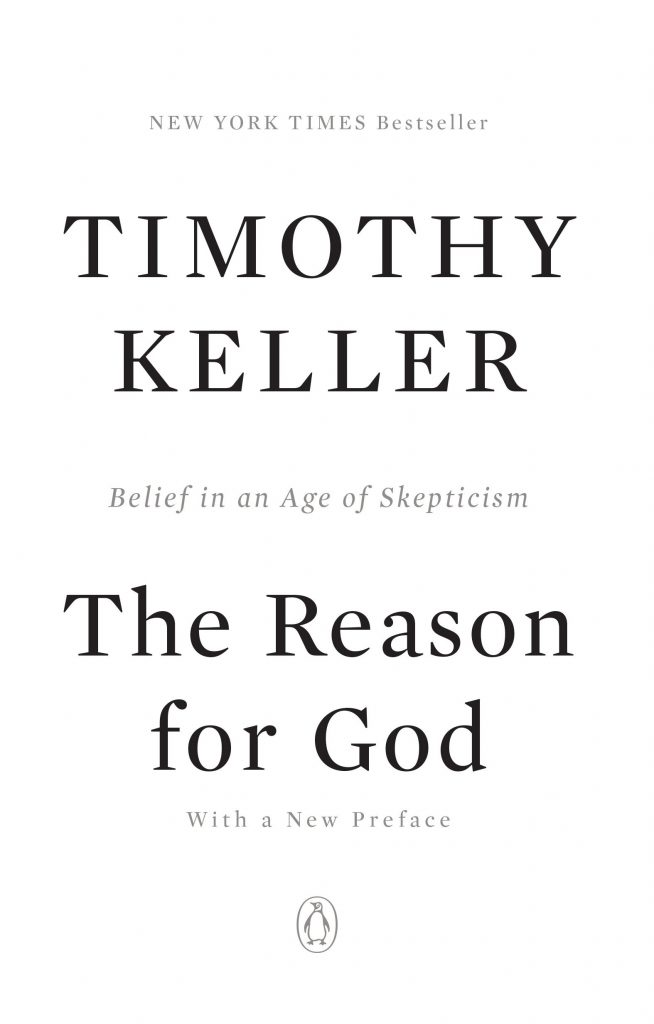
I first read The Reason for God in 2008. At the time, I had never heard of Tim Keller or Redeemer Presbyterian Church. I don’t even remember how I first heard of the book. But I am so very thankful to God that I did. This book has proven to be one of the most important books in my entire ministry. I have purchased it for others, my wife and sons have read it, and twelve years later I am still coming back to it.
Why is this book so useful? Tim Keller not only understands Scripture, he understands culture and people. The Reason for God is divided into two primary parts. In the first part, Dr. Keller engages with the seven most common objections to the Christian faith, among them such questions as why all religions cannot be true, how a loving God could send people to Hell, why science doesn’t conflict with Christianity, and why it’s not nutty to take the Bible literally.
What makes Tim’s approach to these questions unique is that, unlike other would-be Christian apologists, he doesn’t rely on pat answers or look for shortcuts. He lays out the objection in its strongest form, even citing relevant authorities on the questions. Then, after making every effort to be accurate and honest about the problem, he engages it thoughtfully from the standpoint of orthodox Christian faith. As I read each chapter in this section of the book, I came away not only with a better understanding of the Christian answer, but also with a clearer grasp of the concerns as they are held from an non-believer’s standpoint. This is an incredibly valuable resource for those of us who hope to be used by God to encourage our non-believing family and friends toward Christ with gentleness and respect.
After a short chapter entitled “Intermission” in which he tidies up his treatment of the common objections to the faith, Dr. Keller spends seven more chapters laying out the positive case for the Christian faith. As in the first half, what stands out is how he refuses to fall back on Pollyanna statements or simplistic constructions. Without compromise and without condescension, he slowly builds the strongest case possible for belief in Jesus Christ. And in fact, just about the time you could picture somebody saying, “Yeah, but…”, Tim raises the question himself. It is this aspect of his presentation that is particularly winsome: it is robustly orthodox, yet takes nothing for granted.
There is an emphasis recurrent throughout the book that I think deserves special mention. Although Keller does not shy away from dealing with what appear to be the most thorny questions for contemporary readers (such as evolution, historical church abuses, and the biblical view of women), he nevertheless makes a point of continuing to bring the focus back to where it needs to be: on the core claims of Christianity. The point is made clearly as follows:
You may appeal, “But I can’t accept the Bible if what it says about gender is outmoded.” I would respond to that with this question – are you saying that because you don’t like what the Bible says about sex that Jesus couldn’t be raised from the dead? I’m sure you wouldn’t insist on such a non sequitur. If Jesus is the Son of God, then we have to take his teaching seriously, including his confidence in the authority of the whole Bible. If he is not who he says he is, why should we care what the Bible says about anything else?
Think of it like this. If you dive into the shallow end of the Biblical pool, where there are many controversies over interpretation, you may get scraped up. But if you dive into the center of the Biblical pool, where there is consensus – about the deity of Christ, his death and resurrection – you will be safe. It is therefore important to consider the Bible’s core claims about who Jesus is and whether he rose from the dead before you reject it for its less central and more controversial teachings.
The Reason for God (New York: Dutton, 2008), 113.
I think Keller’s point here is extremely valuable, for both believers and non-believers. When sharing or exploring the Christian faith, we need to make sure we buy the house before we consider weeding the garden. Overall then, The Reason for God is superb. It shows how Christianity is a reasonable faith. It shows how Christianity is a faith of grace, unlike all man-made religions. And it demonstrates how the resurrection of Jesus Christ really does change everything. In my estimation, it will be for our century what C.S. Lewis’s Mere Christianity was for the last. Buy and read it for yourself. Then share it with both your Christian and non-Christian friends. Splurge for the hardcover edition – you’ll want to be coming back to it for years to come.

This was extremely helpful. I had listened to his sermon on it but I am looking forward to reading this book